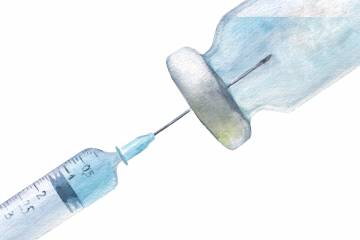The United States is seeing a troubling rise in coronavirus cases in a majority of states, and the nation's leading infectious diseases expert is urging a unified public health approach to curbing cases.
"I think what [our national response is] begging for is a consistent, uniform approach of all of this country pulling together to extinguish this high level of community spread," said Anthony Fauci, director of the National Institute of Allergy and Infectious Diseases, during a virtual "fireside chat" hosted Friday by Johns Hopkins University. "You kind of have to think about the country as a gigantic forest—when there are fires in one part of the forest, the other part of the forest is vulnerable."
Fauci joined Ellen MacKenzie, dean of the Bloomberg School of Public Health, for the discussion, which marked the launch of the university's new Health Policy Forum series. The series is jointly sponsored by the schools of Medicine, Nursing, and Public Health, and the Carey Business School. It is designed to bring together Johns Hopkins faculty, students, and operational experts with policymakers to explore the development and implementation of health policy interventions.
The lack of a unified national approach is what handicapped the U.S. response earlier this spring, Fauci said. A surge in the Northeast was followed by rising cases in the Midwest and South. As a result, the national baseline of community transmission has never dropped to a contained level of below 10,000 cases per day. Now, Fauci said, the national baseline typically hovers between 40,000 and 50,000 cases per day. Today, data from the Johns Hopkins Coronavirus Resource Center shows daily case numbers have climbed to over 60,000.
"You can't enter into the cool months of the fall and cold months of the winter with a high community infection baseline," he said. "It's still not too late to vigorously apply good public health measures."
Chief among those public health measures are avoiding crowds and gatherings, a uniform wearing of masks, maintaining social distance in public, practicing good hand hygiene, and, when possible, interacting with others in outdoor, well-ventilated areas.
These are all practices, Fauci emphasized, that can be accomplished without shutting down the country's economy.
"Whenever we public health officials talk about implementing public health measures, people think that we want to shut the country down," Fauci said. "We don't want to do that. We want to use public health measures in a prudent, careful way to help us to reopen the country. To reopen the economy. To get jobs back. Public health measures need to be the vehicle and the gateway to opening the economy, not the obstacle."
Misperceptions about how social distancing measures affect the economy are not the only messaging obstacles Fauci and other public health officials face. A primary concern that must be addressed now is instilling faith in the safety and effectiveness of a coronavirus vaccine and rebuilding the public's trust in science more generally.
"We've got to do it correctly," Fauci said of the U.S. coronavirus vaccine development initiative called Operation Warp Speed. "We have to insist on the scientific standards that we put forth before we make a decision about whether [a COVID-19 vaccine] is safe and effective. We can't compromise. The public is trusting us, and if we really want to get into a problem of dissolution of trust, it would be to veer from sticking strictly to the scientific data and the scientific information."
Additionally, Fauci urged the scientific community more broadly to adhere to what he called the tenets of science—transparency, honesty, flexibility, the humility of "knowing that we don't know everything at every given time," and the ability to evolve. Science, he explained, is self-correcting, meaning that as more data and evidence emerge, beliefs or findings that were once held true can be revised. Rather than demonstrating a faulty scientific practice, revision instead proves that the scientific method is working as it should. Honesty and transparency, he said, would help retain the public's trust.
It's a technique that proved effective earlier in Fauci's public career, when he launched the NIAID response to the HIV/AIDS crisis. Then, as now, he faced difficulty mobilizing people to curb the spread of a life-threatening disease and spreading the message that the disease affects more than just a small section of people. Disabusing Americans of the notion that they could not be affected by HIV/AIDS and building trust among the public proved vitally important to containing the spread of the disease.
"If you're interested only in individual health, you're putting yourself in somewhat of a vacuum," Fauci said. "That would be fine if your infection didn't ultimately impact other people."
Getting that message across to Americans in a coordinated, government-supported effort will prove critical to ending the pandemic, Fauci said. Returning to normal will likely depend on vaccine uptake—how many people become vaccinated against COVID-19—and adherence to further proven public health measures until the baseline community transmission rate drops and herd immunity emerges.
The stakes could not be higher, he said.
"We've got to get the message to people that if you get infected, even if you don't have a single symptom, what you are doing is you are propagating a pandemic," Fauci said. "By getting infected, you're keeping the pandemic alive."
The next installment of the Health Policy Forum will be hosted by Paul B. Rothman, dean of the medical faculty and CEO of Johns Hopkins Medicine.
Posted in Health, Voices+Opinion, Politics+Society
Tagged health policy, coronavirus, covid-19








